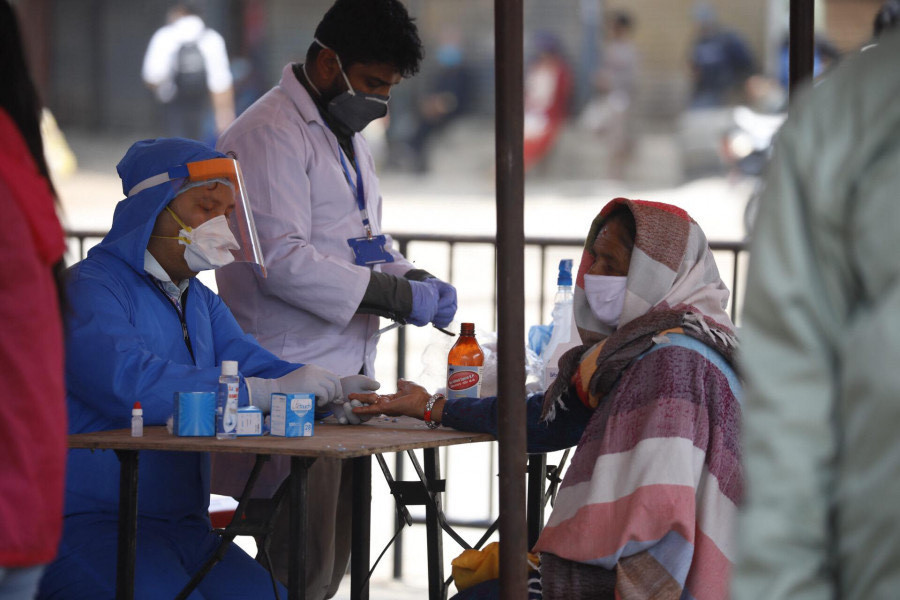Columns
Respect the rights of all people
Our humanitarian support must not come at the expense of the safety and wellbeing of those we are committed to serve.
Valerie Julliand
World Humanitarian Day comes at a time when the whole world is facing the challenge of responding to the Covid-19 pandemic; a crisis that has already claimed many lives and threatens many more. Today we are paying special tribute to the real-life heroes who are fully committed and dedicated to helping people all over the world. We recognise and celebrate this solidarity, community and global partnership which drive humanitarians to save and protect lives despite the conflict, insecurity, and risk to their own health.
When I first arrived in Nepal, the country was building back from the 2015 earthquakes. Now, it is looking to recover from a pandemic. The effects have not just been on the health system, but also on social development and the economy. Sadly, in Nepal, humanitarian emergencies are frequent events, as I have witnessed myself—the recovery from the earthquakes and the reconstruction, recurrent floods, landslides, droughts and now the pandemic. The monsoon rains are a daily reminder that we might be facing concurrent disasters.
Across all these challenges, people in their communities have worked tirelessly with the government at all levels to assist those in need. Working under extreme circumstances and pressure, however, does not mean that we let down our guard and our standards. I would like to call on all actors in the ongoing responses in Nepal to continue to respect the rights of all people, especially women and girls, youth, minorities and marginalised groups, to be safe from discrimination, sexual exploitation and abuse. Our humanitarian support must not come at the expense of the safety and wellbeing of those we are committed to serve.
In communities across Nepal, we have countless examples of real-life heroes who are working to alleviate the hardship of others and help those that are most vulnerable. One such humanitarian is Hema Thapa, who is a hospital administrator and has been involved in treating Covid-19 patients from the start of the pandemic in Nepal. She is a nurse administrator at the Narayani Hospital in Birgunj, Parsa. Hema was part of the team at the hospital that treated some of the first few people in Nepal to be infected by the novel coronavirus. She recalls this period as being one of extreme stress, uncertainty and fear. Hema and her team were away from their families for extended periods of time, as they were doing two-week shifts. After their two-week work shift was over, they had to quarantine themselves for another two weeks before going back to their families. Being a woman frontline worker added to the challenge, according to Hema, as she had to juggle her duties at work with that of caring for her family—including elderly members—all of whom were deeply worried for her.
Another front-line humanitarian is Mitraminu Dhakal, who is in-charge of Prapcha Health Post, Molung Rural Municipality, Okhaldhunga. Following the Covid-19 outbreak, he has done all in his power to mitigate the impact of the pandemic. In addition to treating patients at the health facility until late at night, he visits people suffering from chronic diseases, who are on regular medication and are staying indoors amid infection fears, bringing them medicines. As the pandemic is still ongoing, he reaches out to pregnant women and lactating mothers to ensure they are taking necessary precautions to avoid infection. Furthermore, he counsels adults on how they protect themselves and their families. These are but two of the many people in Nepal working tirelessly during these difficult times.
When I look ahead, I wish that Nepal will take advantage of the wealth of capacities, knowledge and diversity that exists and is part of the richness of the country. The willingness, resilience and strength in communities are one of the best and strongest combinations to respond to any disaster and uplift societies. Particularly at the provincial and local level, we have seen an opportunity to benefit from the proximity and knowledge of the communities. Nepal is in many ways ahead of the game; it has the advantage of having long-standing research and academic interest on disaster risk reduction from which it can benefit. A scientific evidence base can help make sound and strong policy decisions. Development can never be a trade-off for increased natural risks. I hope that Nepal continues on its development trajectory, with disaster risk management as an integral part of it, to spare populations from humanitarian crises.
Let me end by saluting my colleagues—national and international—who have worked tirelessly alongside me during Covid-19 as well as other emergencies. This is a day to commemorate humanitarian workers killed and injured in the course of their work, and to honour all aid workers who continue, despite the odds, to provide life-saving support and protection to people most in need.




 18.12°C Kathmandu
18.12°C Kathmandu















